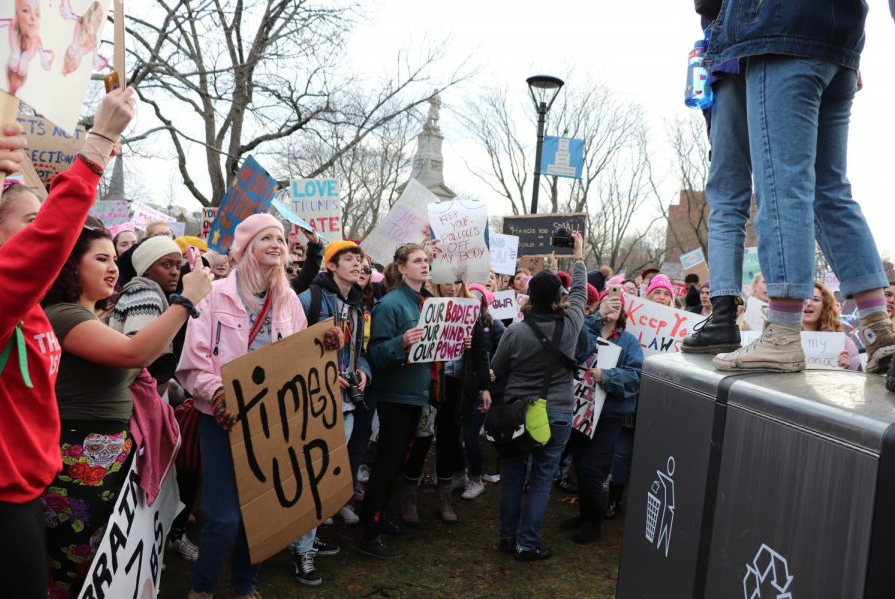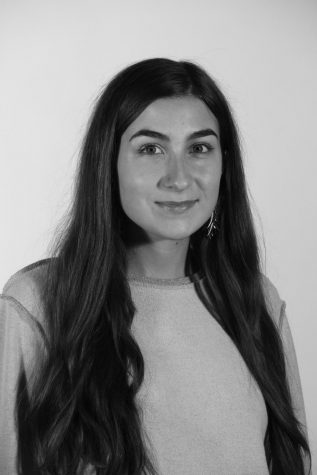Students Upset, Not Surprised, at Kavanaugh Confirmation
Women protesting last January in Cambridge for equal rights.
October 30, 2018
On July 10th, President Trump nominated Judge Brett Kavanaugh to the Supreme Court to fill the seat vacated by the retirement of Justice Kennedy. At the time, Trump described Kavanaugh as a man of “impeccable credentials” and a “true thought-leader among his peers.”
The Republican-controlled Senate Judiciary Committee started confirmation hearings September 4th. Once the hearings were completed, most believed the eleven Republicans on the committee would vote to send Kavanaugh to the full Senate for a vote without any support from Democrats.
That committee vote was delayed when Dr. Christine Blasey Ford stepped forward, saying that Kavanagh sexually assaulted her when they were in high school in the 1980s. On September 27th, Dr. Ford testified before the committee describing a situation where Kavanaugh and a friend, Mark Judge, trapped her in a room, pinned her on the bed, and sexually assaulted her. Allegedly, both Judge and Kavanaugh were highly intoxicated.
While only Dr. Ford has testified before the Committee, Deborah Ramirez also came forward and alleged that Kavanaugh exposed himself to her during a party at Yale. Additionally, Julie Swetnick has alleged that she saw Kavanaugh inappropriately touch girls while they were in high school.
The hearings elicited a range of emotions and opinions from the CRLS community. Senior Peterlee Dorielan was confused about why Dr. Ford waited so long to speak out about the alleged assault, asking “Why wait when the guy is about to get in more power to try and stop it?”
Primarily due to Dr. Ford’s delayed reporting of her incident with Kavanaugh, a concern that both parties have is that her story may not be the whole truth. Dorielan shares this concern saying, “hopefully she’s not lying.” Others, such as Jinho Lee ’22, believe doubting women in positions like Dr. Ford is uncalled for, “Coming from a guy, I think it is [expletive] ridiculous that men have set up this narrative that women are liars and crazy when it’s our fault.” While not conclusive, Dr. Ford took a lie-detector test in August which showed “no deception.”
Many CRLS community members viewed Kavanaugh’s attitude alone as disqualifying. Civics teacher and teaching assistant program advisor, Ms. FitzGerald, remarked, “Besides the fact that [Kavanaugh] is most likely a sexual predator, it is clear that he doesn’t have the temperament to be an independent judge on the Supreme Court.” Freshman Felix Prasanna shared similar sentiments, saying, “I think Kavanaugh was a bad nomination pick because he is partisan, he cannot keep his temper, he is also a sexual abuser, and that is not a good example to set for judges of the highest court in this land.”
An additional FBI investigation was held following Dr. Ford’s testimony due to pressure from a bipartisan group of senators. The investigation’s findings were kept private, with access only permitted to senators. Following the release of the report, Kavanaugh was confirmed with a highly partisan 50-48 vote.
The confirmation of Kavanaugh elicited feelings of disappointment and hopelessness for women, but not shock. Senior Josie Weissburg commented, “I think that this sort of event was bound to happen based on our current political climate and the #MeToo movement. I’m not surprised that Kavanaugh got confirmed, and even if he didn’t, some equally qualified, conservative judge would have been appointed since I doubt the Democrats will win the Senate.”
In an email, photography teacher Ms. Milligan told the Register Forum, “I get interrupted, not listened to, ignored, and have had men take credit for my ideas many times in my life. All of the women I know also experience this. We talk about it. We watch it happen. We fight against it.” She continued, “I’m hopeful at times, discouraged at times. And, I sometimes leave meetings shaking my head at the unfairness of it all.”
This piece also appears in our October 2018 print edition.











